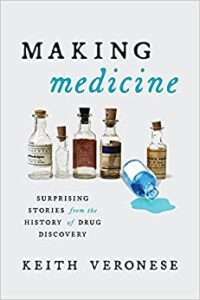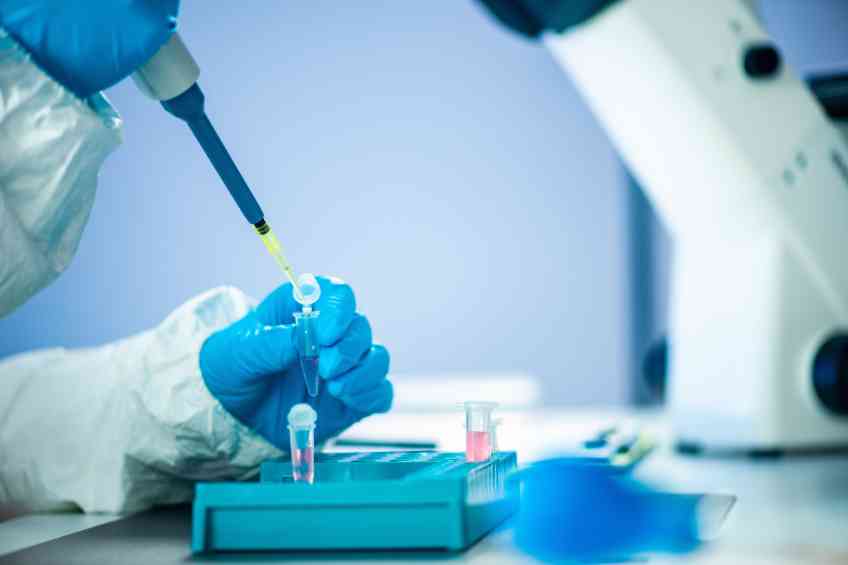Have you ever poked around an average medicine cabinet? Chances are you’ll find a lot of prescriptions—many of which are probably out of date. The drugs in any single cabinet shouldn’t be surprising since the United States is the largest pharmaceutical market in the world. The Federal Drug Administration (FDA) has approved more than 20,000 prescription drugs and usually adds 40 to 50 more each year. Pharmaceuticals are big, big, big business—and it is getting bigger all the time. Besides the financial incentive, developing life-saving drugs is a noble aim. It isn’t, however, a clean run from concept to production. The history of medicine has turns and twists that have often led to unexpected discoveries that wound up saving millions of lives. Keith Veronese, the author of Making Medicine: Surprising Stories from the History of Drug Discovery, came to grips with the circuitous process for his book. He recently spoke to WellWell about the why and how of making medicine, the ability of crisis to spur important development and what history tells us about the future of medicine.
What was the common denominator in the medicines you studied?
Several of them are just kind of accidental discoveries, or they just stayed hidden until there was a new application. Some discoveries were almost thrown away until there was a way to apply them. Sometimes this took years. And in a couple of cases, war played a huge role because it spurred research. There is money for the military.
Tell me a little bit more about penicillin.
It took years to get this into full-scale distribution. In the thirties, when a product that included penicillin was used to treat issues, they noticed the problems went away after a few days. But it wasn’t until the early forties when there was an effort to try to isolate it, but they had a lot of trouble. The work was spurred on by the war effort because they realized they needed to get it out to everybody. Military spending got it going. They had to do this because of the critical need.
So, when did penicillin become available?
It was 1944 for the military and was publicly available in 1945 in the US. They were trying to get up before D-Day so that would be on hand. They knew it was important.
Penicillin is a classic example. But what years and types of medicines do your book cover?
The medicines involved cover several centuries. Some elements start in the 1700s, and then one of the last things it covers is Viagra. So that takes us into the 21st Century.
Is there something fundamental to the process?
A lot of times, it involves some individual molecules. The researchers, scientists, and whoever comes across the module first and then realizes it does something basic. It can then lead to the development of medicine down the line.
Do you need a war or pandemic to develop these, or would some of these medicines evolve through ongoing research?
In some situations, there’s more money put aside to benefit a particular sector or need, like antibiotics. We need antibiotics, but there are not many coming out at the industrial level. Universities are working on it because more money is in it. But ultimately, they find a way to make it work better to make more money.
How does big pharma play into all of this, good or bad?
Big pharma does get a bad rap, and there are some reasons for that. You put out a different formulation of a pharmaceutical similar to a previously existing medication and get new patents, and then you have far more expensive drugs that you can sell for 15 or 20 years. But it can be extremely expensive to get something to clinical trials. There is also the risk of getting something to a phase one clinical trial that doesn’t work out, and the pharmaceutical company is out that money. So, it’s two-sided. A lot of these issues of big pharma end up being money gained or lost based on good and bad reasons.
Does having this ability to make enormous amounts of money encourage the pharmaceutical development of a wide range of drugs, or do drug companies pour money into specific areas where they believe they can make money?
The increased financial incentive does impact their focus. In the end, there is a correlation between the increase in money and the number of patents.
What do most people not realize about the evolution of medicine?
One thing not covered in the book is the failures. The number of failures before you find the medication that works. Drugs that are in animal trials but never make it beyond are high. There is a lot of trial and error before you get one that works.
What surprised you about your research?
Some of the people’s stories; there is one about nitrous oxide. That was my favorite chapter today. You know we use it. But it took years of stops and missteps to get where we are today.
What do this book and your other background tell us about how we dealt with the current pandemic and how we may deal with the next pandemic?
A foundation of research is critical, and thankfully we have well-disseminated research findings in online journals. The starting point has to be standing on the shoulders of giants who have conducted previous research because you don’t often do it again when confronting the next issue. You’re not starting from square one.
So, we will build off the research already done, even if it’s a different pandemic issue?
Yes, you can change your vaccines much quicker based on what we know now or at least what seems at risk. We’ve known for a long time there are a bunch of different strains of influenza, so you tailor next year’s vaccine to what you have seen in the previous year and other countries.
When the pandemic hit, there was some speculation that we would not get a vaccine for years or no less than five years. But they were able to develop vaccines much faster. I understand researchers were standing on the shoulders of giants, but how were vaccines so much quicker than most anticipated?
We had the money thrown at it. Plus, everybody was banding together to work on it, combined with the amount of money put in stopped society for a little while. It came to light that it came together a lot quicker because of the money and everyone working together in disseminating information back and forth.
In part, it always goes back to resources and effort, I guess?
Yes, it is always part of the answer.

About Keith Veronese
Keith Veronese is a chemist and author. He holds a Ph.D. in chemistry from the University of Alabama. His latest book is Making Medicine: Surprising Stories from the History of Drug Discovery at Birmingham in 2011. He is also the author of Rare: The High-Stakes Race to Satisfy Our Need for the Scarcest Metals on Earth.
Please visit keithveronese.com to learn more.
Purchase Making Medicine at Amazon.com.












